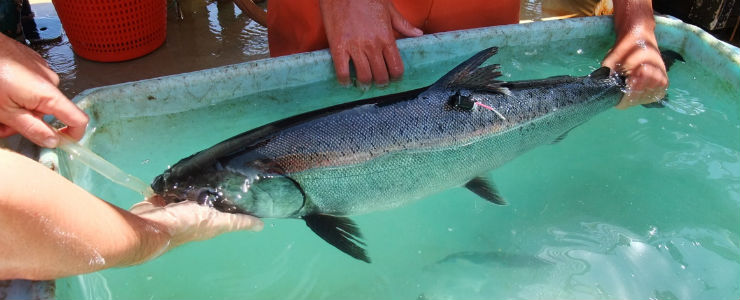The Institute of Marine Sciences provides opportunities, facilities, and support for collaborations among scientists within the institute and with other marine research institutions, particularly those around the margins of Monterey Bay. The institute's facilities on the UCSC Main Campus and land available at the Coastal Science Campus have become magnets to which other marine programs and scientists have been attracted to advance cooperative research.
In 1997, the Office of Spill Prevention and Response of the California Department of Fish and Wildlife completed the Marine Wildlife Veterinary Care and Research Center at the lab, which was planned and constructed to both respond to the impacts of an oil spill on sea otters and other threatened marine life, but also to carry out research on sea otters and their health, a joint effort with IMS scientists.
In 2000, the NOAA Fisheries Southwest Fisheries Science Division completed a new research laboratory, the Fisheries Ecology Division located on the Coastal Science Campus. The presence of over 140 federal and UCSC scientists and staff have led to very productive interactions and collaborations between marine biologists within the institute and NOAA fisheries scientists. These scientists support graduate students, fund collaborative research, jointly fund a faculty position and share research facilities with IMS scientists.
A long history of collaboration with the Pacific Coastal and Marine Team of the U.S. Geological Survey were greatly enhanced by the relocation of about 100 of the agency's coastal scientists and staff to a facility located close to the Coastal Science Campus. Collaborative research, funding of post-docs, graduate students and undergraduates, participation on graduate student dissertation committees, and seminars focusing on research areas such as coastal and nearshore processes, tsunamis, coastal hazards, human impacts on the coastal ocean and seafloor imaging and mapping are some of the benefits of this group's presence.
There are also collaborative research programs and projects performed in tandem with affiliated organizations that provide opportunities for faculty, researchers, and students to work with conservation organizations and federal agencies such as the Fisheries Collaborative Program, The Nature Conservancy's Marine Initiative, Island Conservation, California Sea Grant, and The Natural Capital Project.

